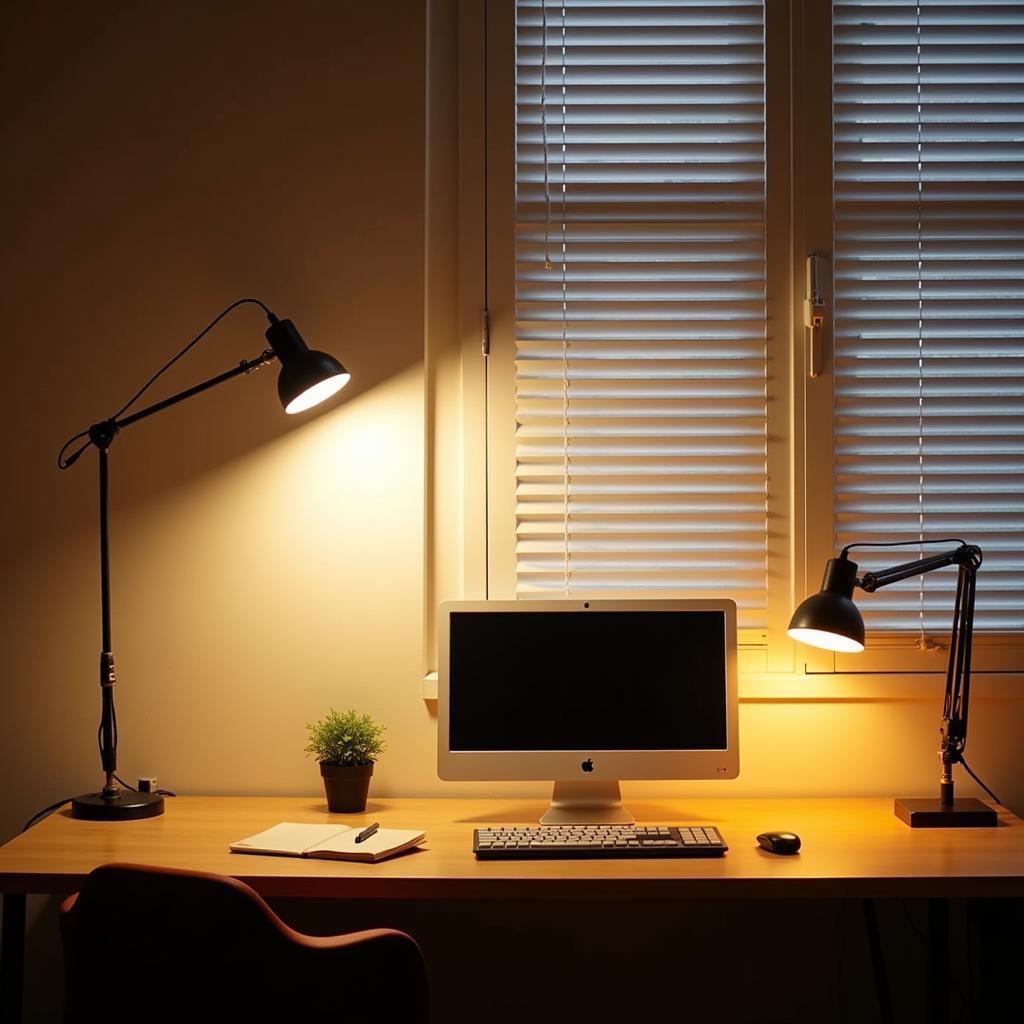Choosing the right lighting for your study space can significantly impact your focus, productivity, and even your sleep. Finding the best color light for studying involves understanding how different light colors affect your brain and body. Let’s dive into the spectrum of options and illuminate the path to a more effective study environment.
After a long day, finding the right lighting can make all the difference in your study session. Have you ever wondered what color light is easiest on the eyes? Check out this helpful guide! what color light is easiest on the eyes
Understanding the Impact of Light Color on Studying
Different colors of light emit different wavelengths, influencing our circadian rhythm and cognitive functions. The wrong lighting can lead to eye strain, headaches, and difficulty concentrating, while the right light can enhance focus and improve learning.
Blue Light: The Double-Edged Sword
Blue light, abundant in natural daylight and emitted by electronic devices, boosts alertness and cognitive performance during the day. However, excessive exposure, especially at night, can suppress melatonin production, disrupting sleep patterns. Therefore, while blue light can be beneficial for studying during the day, it’s crucial to limit exposure closer to bedtime.
Warm White and Yellow Light: Promoting Relaxation and Focus
Warm white and yellow light create a calming and cozy atmosphere, reducing stress and promoting relaxation. These colors are ideal for evening study sessions, as they are less likely to interfere with sleep. They also create a comfortable environment, which can be beneficial for long study periods.
Green Light: A Potential Contender
Emerging research suggests that green light may offer unique benefits for focus and concentration. Some studies have shown that green light can improve attention span and reduce mental fatigue. While more research is needed, green light might be a promising option for enhancing study performance.
Choosing the Best Light for Your Study Needs
The best light color for studying depends on individual preferences and the time of day. Consider these factors when making your choice:
- Time of Day: Blue light is suitable for daytime studying, while warmer colors are better for evening sessions.
- Study Environment: A bright, well-lit space is essential, regardless of the color temperature.
- Personal Preferences: Experiment with different colors to find what works best for you. Some people prefer cooler light, while others find warmer tones more comfortable.
Creating a Balanced Lighting Scheme
Incorporating a combination of light sources can optimize your study environment. Use a desk lamp with adjustable color temperature settings to switch between blue light for focused work and warmer light for relaxing breaks. Ambient lighting with warm white or yellow hues can create a comfortable overall atmosphere.
Want to learn how to achieve realistic coloring in your artwork? This guide might help! how to color realistically
Optimizing Your Study Space for Lighting
Beyond choosing the right color, optimizing your study space for lighting involves:
- Positioning your light source: Place the lamp to minimize glare and shadows.
- Controlling ambient light: Use curtains or blinds to reduce distractions from outside light.
- Taking breaks: Regular breaks are crucial to prevent eye strain and maintain focus. This also helps regulate your body’s natural response to light.
 Study Room Lighting Setup
Study Room Lighting Setup
Conclusion
Choosing the best color light for studying involves understanding the impact of different colors on your brain and body. By considering factors such as time of day, study environment, and personal preferences, you can create a lighting scheme that enhances focus, productivity, and overall well-being. Experiment with different options and find the perfect balance that illuminates your path to academic success. Remember that the right lighting can transform your study space into a haven of concentration and learning. What color light is best for studying? The answer lies in understanding your individual needs and creating a personalized lighting strategy.
Are you interested in learning how to mix skin tones with paint? Click here for a comprehensive guide. how to make skin tone color with paint
FAQ
-
Can I use smart bulbs for studying? Yes, smart bulbs offer adjustable color temperature and brightness, making them ideal for customizing your study lighting.
-
Is natural light good for studying? Natural light is excellent for studying during the day, as it provides a full spectrum of light that boosts alertness and mood.
-
How can I reduce eye strain while studying? Take regular breaks, adjust your screen brightness, and ensure proper lighting to minimize eye strain.
-
What is the best light color for reading before bed? Warm white or yellow light is best for reading before bed, as it promotes relaxation and won’t interfere with sleep.
-
Does the color of my walls affect study lighting? Lighter wall colors reflect more light, creating a brighter study space.
Need help changing the highlight color on a PDF? how to change highlight color on pdf This article provides step-by-step instructions.
Common Study Lighting Scenarios and Solutions
-
Scenario: Glare on computer screen causing eye strain. Solution: Adjust the position of your desk lamp and/or use an anti-glare screen protector.
-
Scenario: Feeling sleepy while studying at night. Solution: Switch to a cooler light color like blue or switch to a daytime study schedule.
-
Scenario: Difficulty concentrating in a dimly lit room. Solution: Increase the overall brightness of your study space and use a task lamp for focused light.
Further Reading & Resources
For more information on related topics, you might find these articles helpful: “The Importance of Ergonomics in Your Study Space” and “Creating a Distraction-Free Study Zone.”
Need Help with Your Study Space Design?
Contact us for expert advice and personalized solutions. Call: 0373298888, Email: [email protected], or visit us at 86 Cầu Giấy, Hà Nội. Our customer service team is available 24/7.
